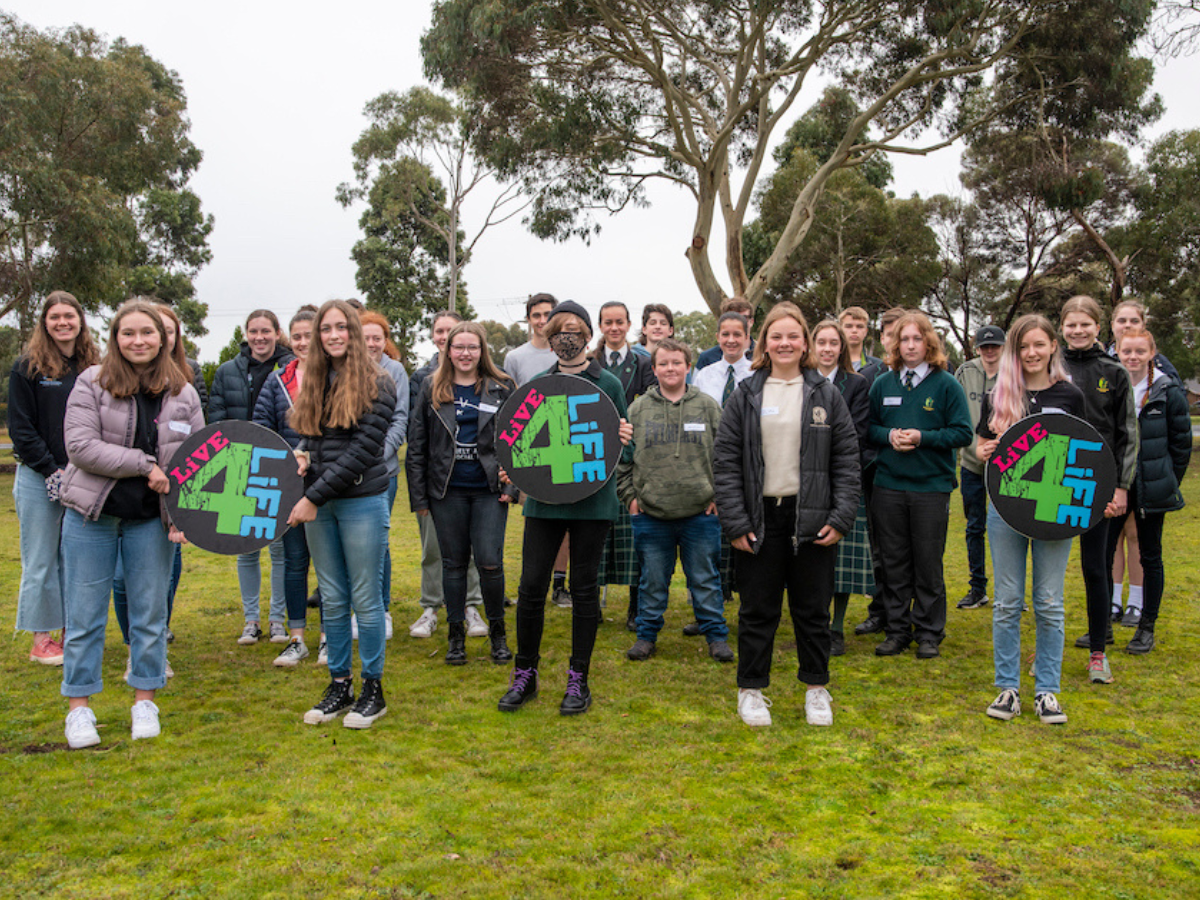Foundation for Rural & Regional Renewal (FRRR)
Beyond the Bell Great Southern Coast applied to the In a Good Place program, on behalf of the Southern Grampians Live4Life Partnership Group, for funds to support the implementation of the Live4Life model in the Southern Grampians Shire.

Live4Life is a community-grown, evidence-based, rural youth mental health model designed to prevent youth suicide. The Live4Life model aims to ensure that young people, teachers, parents and the wider community are better informed about mental ill health so they can be proactive in identifying the signs and symptoms of an emerging mental health issue before a crisis occurs.
The Live4Life model focuses on an ‘upstream’ approach to mental health education and suicide prevention to build resilient young people and communities. This is achieved by ‘wrapping’ protective factors around young people such as supportive relationships, support at critical times, positive help-seeking attitudes, connection to family, school and community and positive peer role models.
The school-based project to support Youth Crew activities and mental health education was all geared up ready to go when COVID first struck and schools and communities across the country went into lock-down.
After a year of navigating the challenges of not being able to deliver face-to-face programs and other challenges such as the loss of the Youth Engagement Officer, who normally coordinates the crew activities, the group developed new strategies and approaches that enabled them to successfully deliver the activities in a COVID-safe manner, including a new model of blended Youth Mental Health First Aid (YMHFA) training.
The group was highly successful in maintaining the momentum of the project, despite delivering a personal development program and training in a lock-down environment. They launched a social media presence on Instagram during Mental Health Week and created various collateral and promotional materials such as stickers, posters and help-seeking flyers to use in info packs to be distributed to students at in-school promotional events.
Once the Partnership Group was able to recommence activities within the community, they successfully delivered a series of Leadership and YMHFA courses and training sessions using a mix of face-to-face session and a blended online model via Zoom, reaching across six schools and eight allied community-based organisations that work with young people.
The organisation reported that what they were most proud of about the expansion of the Live4Life project into the Southern Grampians Shire, which they estimate has directly benefitted at least 950 people, was the engagement of the young people who joined the Live4Life CREW. They also mentioned the local YMHFA Instructor training, which has increased the community’s capacity to deliver more training across the Southern Grampians region.
The lastest news on the project from the Southern Grampians Live4Life website reports:
The project has led to increased community capacity and shared awareness of preventative mental health strategies through the MHFA training, as well as a deeper engagement with the Partnership Group in a broader context. They report that there is a noticeable increase in collaboration across the Southern Grampians area, possibly due to participation in the Live4Life initiative that connected people and agencies / organisations, and promoted collaboration centred on young people in the Shire.
“I think the most rewarding part of being in the Crew is seeing the difference you’ve wanted to achieve happen. Getting people into the idea of talking about mental health is hard but I think it’s slowly starting to happen, with the Crew being a part of that change.” – 2023 Crew member, Southern Grampians
Huon Valley council acknowledges Traditional Custodians of the South East Nation, the Melukerdee people of the Huon River and the Lyluequonny people of the Far South.
Following a number of suicides in the Huon Valley in southwest Tasmania, the community indicated an interest in learning more about mental health and how to best support a family member, friend or colleague who may be struggling with their mental health.

With the help of a $9,255 grant through the In a Good Place program, supported by CCI Giving, the Mental Health Community Response project was initiated. Its goal was to build capacity in the Huon Valley to respond to and prevent suicide and promote mental health through the delivery of mental health first aid training to community members and groups. By providing the tools, community members could better understand and support members of the local community who may be self-harming or suicidal.
The Huon Valley Council took on a project coordination role, working closely with the Rural Alive and Well program, to reduce the stigma of suicide by promoting events widely across the community, encouraging conversations about mental health. They also ran three 12-hour Mental Health First Aid programs across some of the smaller communities in the Huon Valley, as well as delivering two self-injury focused workshops to community members struggling to support family members who self-harm.
The Huon Valley Council’s contribution was significant, as participants appreciated being able to complete the training at an affordable cost and within their own local community. COVID posed several challenges, with the delivery of training delayed, as it was agreed that face-to-face sessions were important, given the nature of the training.
Communities and individuals in the Huon Valley are now better equipped to support each other, their community, family members and colleagues dealing with serious mental health issues such as self-harm or suicidal ideation. Community networks were built and reinforced by the project. At the completion of the project, participants had the confidence and resilience to share stories and have conversations in a secure and inclusive environment, to further reduce barriers associated with discussing mental health and suicide.
For more inspiring stories like this, head to our FY 2021/22 Annual Review.

